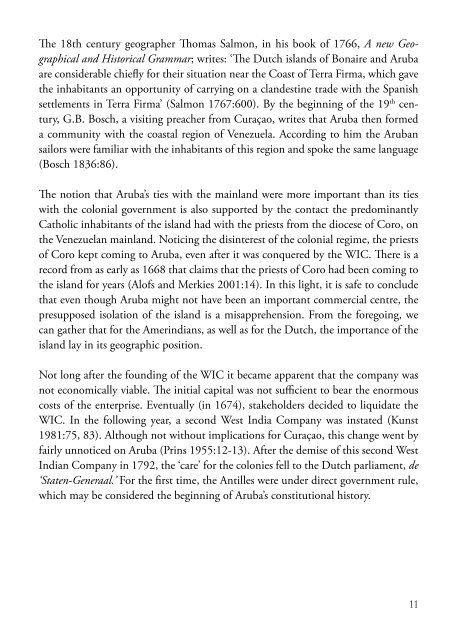Aruba navigating globalizing world.pdf - sociology-of-development
Aruba navigating globalizing world.pdf - sociology-of-development
Aruba navigating globalizing world.pdf - sociology-of-development
You also want an ePaper? Increase the reach of your titles
YUMPU automatically turns print PDFs into web optimized ePapers that Google loves.
The 18th century geographer Thomas Salmon, in his book <strong>of</strong> 1766, A new Geographical<br />
and Historical Grammar; writes: ‘The Dutch islands <strong>of</strong> Bonaire and <strong>Aruba</strong><br />
are considerable chiefly for their situation near the Coast <strong>of</strong> Terra Firma, which gave<br />
the inhabitants an opportunity <strong>of</strong> carrying on a clandestine trade with the Spanish<br />
settlements in Terra Firma’ (Salmon 1767:600). By the beginning <strong>of</strong> the 19 th century,<br />
G.B. Bosch, a visiting preacher from Curaçao, writes that <strong>Aruba</strong> then formed<br />
a community with the coastal region <strong>of</strong> Venezuela. According to him the <strong>Aruba</strong>n<br />
sailors were familiar with the inhabitants <strong>of</strong> this region and spoke the same language<br />
(Bosch 1836:86).<br />
The notion that <strong>Aruba</strong>’s ties with the mainland were more important than its ties<br />
with the colonial government is also supported by the contact the predominantly<br />
Catholic inhabitants <strong>of</strong> the island had with the priests from the diocese <strong>of</strong> Coro, on<br />
the Venezuelan mainland. Noticing the disinterest <strong>of</strong> the colonial regime, the priests<br />
<strong>of</strong> Coro kept coming to <strong>Aruba</strong>, even after it was conquered by the WIC. There is a<br />
record from as early as 1668 that claims that the priests <strong>of</strong> Coro had been coming to<br />
the island for years (Al<strong>of</strong>s and Merkies 2001:14). In this light, it is safe to conclude<br />
that even though <strong>Aruba</strong> might not have been an important commercial centre, the<br />
presupposed isolation <strong>of</strong> the island is a misapprehension. From the foregoing, we<br />
can gather that for the Amerindians, as well as for the Dutch, the importance <strong>of</strong> the<br />
island lay in its geographic position.<br />
Not long after the founding <strong>of</strong> the WIC it became apparent that the company was<br />
not economically viable. The initial capital was not sufficient to bear the enormous<br />
costs <strong>of</strong> the enterprise. Eventually (in 1674), stakeholders decided to liquidate the<br />
WIC. In the following year, a second West India Company was instated (Kunst<br />
1981:75, 83). Although not without implications for Curaçao, this change went by<br />
fairly unnoticed on <strong>Aruba</strong> (Prins 1955:12-13). After the demise <strong>of</strong> this second West<br />
Indian Company in 1792, the ‘care’ for the colonies fell to the Dutch parliament, de<br />
‘Staten-Generaal.’ For the first time, the Antilles were under direct government rule,<br />
which may be considered the beginning <strong>of</strong> <strong>Aruba</strong>’s constitutional history.<br />
11


